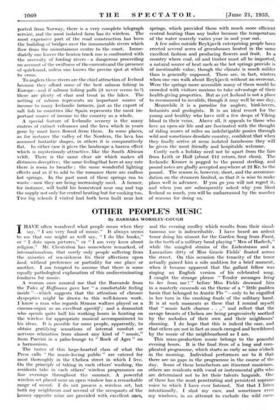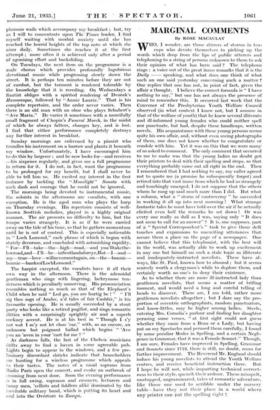OTHER PEOPLE'S MUSIC
By BARBARA WORSLEY-GOUGH
IHAVE often wondered what people mean when they say, " I am very fond of music." It always seems to me that one might as well say, " I do like books," or " I dote upon pictures," or " I am very keen about religion." Mr. Chesterton has somewhere remarked, of internationalism, that surely only people suffering from the miseries of sea-sickness fix their affections upon land, without preference or partiality for one place or another. I am tempted to assume that there is some equally pathological explanation of this undiscriminating fondness for music.
A woman once assured me that the Barcarole from the Tales, of Hoffmann gave her " a comfortable feeling inside "—which suggests that the attention of chronic dyspeptics might be drawn • to this well-known work. I know a man who regards Strauss waltzes played on a cinema-organ as an excellent aperitif ; and a dramatist who spends quite half his working hours in hunting on the wireless for appropriate musical accompaniment to his ideas. It is possible for some people, apparently, to obtain gratifying sensations of internal comfort or nervous relaxation from almost any kind of " music," from Puccini in a palm-lounge to " Rock of Ages " on a harmonium.
The tastes of this large-hearted class of what the Press calls " the music-loving public " are catered for most thoroughly in the Chelsea street in which I live. On the principle of taking in each others' washing, the residents take in each others' wireless programmes on fine evenings throughout the summer. A powerful wireless set placed near an open window has a remarkable range of sound. I do not possess a wireless set, but both my neighbours and several of the occupants of the houses opposite mine are provided with excellent ones, and the evening medley which results from their simul- taneous use is indescribable. I have heard an ardent tenor doing his utmost for the Garden Song from Faust, in the teeth of a military band playing " Men of Harlech," while the mingled strains of the Liebestraum and a Lancashire ditty of Miss Gracie Fields' floated across the street. On this occasion the tenacity of the tenor actually gained him a solo audition for a brief moment, when it became apparent that the gallant fellow was singing an English version of his celebrated song. I caught the strange phrase " Tender messages bring to her from me ! " before Miss Fields drowned him in a masterly crescendo on the theme of a " little pudden basin that belonged to Auntie Flo "—only to be engulfed in her turn in the crashing finale of the military band: It is at such moments as these that I remind myself that " Music hath charms . . .," and reflect that the savage breasts of Chelsea are being progressively soothed by the- melodies of their own and their neighbours' choosing. I do hope that this is indeed the case, and that others are not in fact as much enraged and bewildered by the music of the neighbourhood as 'I am.
- This mass-production music belongs to the peaceful evening hours. It is the final item of a long and com- plicated programme, which starts as early as nine o'clock in the morning. Individual performers see to it that there are no gaps in .the programme in the course of the day. Some of these benefactors are itinerant musicians, others are residents with vocal or instrumental gifts who are determined not to let their talents languish. One of these has the most penetrating and persistent soprano voice to which I have ever listened. Not that I listen intentionally. I shut my ears, and sometimes even my windows,, in an attempt to exclude the wild caco- phonous wails which accompany my breakfast ; but, try as I will to concentrate upon The Times- leader, I- find myself waiting with morbid anxiety until she has reached the horrid 'heights of the top note at which she aims daily. Sometimes she .reaches it at the first attempt ; more often it is achieved only after a period of agonizing effort and backsliding.
On Tuesdays, the next item on the programme is a male chorus which provides profoundly lugubrious devotional music while progressing slowly down the street. It is perhaps ten minutes before they are out of earshot, but the torment is rendered tolerable by the knowledge that it is receding. On Wednesdays a flautist obliges with a spirited rendering of Dvorak's Humoresque, followed- by "Annie Laurie." That is his complete repertoire, and the order never varies. Then there is an old man with an oboe who plays Schubert's " Ave Maria." He varies it sometimes with a mercifully small fragment of Chopin's Funeral March, in the midst of which he always falters, changes key, and is lost. I find that either performance completely destroys any further interest in breakfast.
Sunday mornings are enlivened by a pianist who trundles his instrument on a barrow and plants it beneath my window. Unfortunately, I have encouraged him to do this by largesse ; and he now looks for—and receives —his sixpence regularly, and gives me a full programme in return for it. I do not, in fact, want the programme to be prolonged for my benefit, but I shall never be able to tell him so. He excited my interest in the first instance by tackling the "Moonlight" Sonata with such dash and courage that he could not be ignored.
The mornings being devoted to instrumental music, the soloists in the afternoons are vocalists, with one exception. He is the aged man who plays the harp on Thursday evenings. His repertoire consists of well- known Scottish melodies, played in a highly original manner. The air presents no difficulty to him, but the tempo varies strangely. It is as if he were carried away on the tide- of his tune, so that he gathers momentum until he is out of control. This is especially noticeable in " Loch Lomond," each phrase of which is begun with stately decorum, and concluded with astonishing rapidity. " For—I'll—take—the—high—road,—and you'lltakethe- lowroad,and—I'll—be—inScotlandaforeye,But—I—and— my—true—love—willnevermeetagain, on—the—bonnie- bonnie —banksofLochLomond."
The harpist excepted, the vocalists have it all their own way in the afternoon. There is the adenoidal gentleman who sings with lingering, lachrymose ten- derness which is peculiarly unnerving. His pronunciation resembles nothing so much as that of the Elephant's Child when he said " Led go, you are hurtig be ! " " sig thee sogs of Arabee, a'd tales of fair Cashbir," is his favourite opening. He is usually succeeded by -a stout party who looks like a retired pugilist, and sings romantic ditties _ with a surprisingly sprightly air and a superb cockney accent. He is at his best in " Though I s'y not wot I .m'y not let choo 'ear," with, as an encore, an unknown but poignant ballad which begins "'Ave you an 'avers in your 'eart for me ? "
As -darkness falls, the last of the Chelsea musicians drifts away to find a haven in some agreeable pub. Lights begin to appear in the windows, and a few pre- liminary discordant shrieks indicate that bouseholders are hunting for a wireless programme which appeals to their tastes. The notes of a nasal soprano from Radio Paris open the concert, and evoke an outbreak of (Tooning from next door. Soon the evening performance is in full swing,, sopranos and crooners; lecturers and funny men, 'cellists and fiddlers alike 'dominated by the inevitable military band, which is putting its heart and soul into the Overture to Zampa.









































 Previous page
Previous page